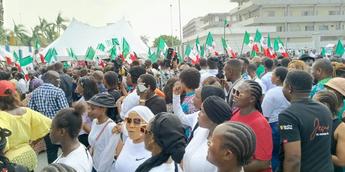Protesters advocating for the EndBadGovernance movement took to the streets, blocking the Rumuokoro axis of the East-West Road, one of the major thoroughfares in Port Harcourt. The demonstration, now in its fifth day, has garnered significant attention, highlighting growing dissatisfaction with governance in Nigeria.
The protesters, who are reportedly operating without a central coordinator, have become increasingly vocal and assertive in their demands. As the movement continues to gain momentum, tensions are rising, with the demonstrators issuing warnings to local traders and transporters who have not joined their cause.
The protest, which began as a peaceful demonstration, has escalated with the participants expressing frustration over what they describe as widespread corruption, poor infrastructure, and a lack of basic amenities in Rivers State and across the nation. The blockade of the Rumuokoro axis is particularly significant, as it disrupts a critical junction that connects various parts of the state and is essential for the movement of goods and people.
On the fifth day of the protest, the demonstrators threatened to “unleash mayhem” on traders and transporters who have not actively participated in the protest. This warning has created an atmosphere of fear and uncertainty among the local populace, as many are concerned about the potential for violence.
The lack of a centralized leadership within the EndBadGovernance movement has made it difficult for authorities to engage in meaningful dialogue with the protesters. However, the demonstrators’ demands are clear: they seek immediate action from both state and federal governments to address issues such as unemployment, inadequate healthcare, failing educational systems, and poor infrastructure.
The situation in Port Harcourt is a microcosm of a broader national movement that is gaining traction across Nigeria. Citizens are increasingly frustrated with what they perceive as a lack of accountability and transparency from their leaders. The EndBadGovernance protest is the latest in a series of civil actions aimed at holding the government accountable and demanding better living conditions for all Nigerians.
As the protest enters its second week, the government faces mounting pressure to respond to the grievances of the people. The possibility of further disruptions looms large, with protesters showing no signs of backing down until their demands are met.
Local authorities are urging for calm and have appealed to the protesters to refrain from violence, emphasizing the importance of peaceful demonstrations in a democratic society. However, with the situation remaining tense, it is uncertain how events will unfold in the coming days.
For now, the blockade at the Rumuokoro axis serves as a powerful symbol of the people’s determination to fight for better governance, even as the state grapples with the economic and social impacts of the ongoing protest.








